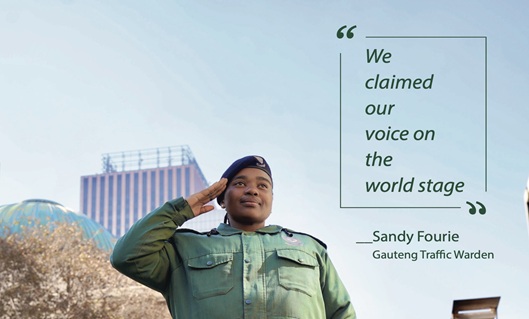Department of Community Safety 2025/06/18 - 15:33

As South Africa commemorates Youth Month and honours the legacy of 16 June 1976, we shine a spotlight on Sandy Fourie, a 32-year-old Gauteng Traffic Warden based at the Johannesburg High Court. Sandy begins each day with a sense of duty, not only to the court but also to her community in Eldorado Park. She firmly believes that young people in South Africa can drive meaningful change within their communities.
For Sandy, Youth Month is a powerful time of reflection and responsibility, particularly in light of the historic events of 16 June 1976. This date serves as a potent reminder of the strength that the youth of that era demonstrated through collective action against injustice. She specifically highlights the peaceful protest against the language policy as a moment of fearlessness, courage, and unwavering demand for quality education. This inherited spirit of unity, she believes, remains crucial for today’s youth in the pursuit of accessible and relevant education.
Among the many inspiring young South Africans, past and present, one figure stands out for Sandy: Solomon Mahlangu. His story, especially his final words – “My blood will nourish the tree that will bear the fruits of freedom” – resonates deeply with her. At just 23 years old, Mahlangu’s sacrifice became a symbol of purposeful resistance. For Sandy, his legacy proves that one committed young person can ignite lasting change.
Sandy dreams of transformation for the youth of Eldorado Park. She highlights substance abuse as a major challenge in her community, linking it to social ills like teenage pregnancy and peer pressure. She envisions a Youth-Led, Community-Based Rehabilitation and Skills Hub, a safe space offering meditation, counselling, skills development, and positive alternatives like sports and the arts. “I advocate for young people to be actively involved in planning, outreach, and peer support to break the cycle of substance abuse,” she says.
In a rapidly evolving world, Sandy believes that today’s youth must equip themselves with key skills to thrive over the next five years: digital fluency, adaptability, critical thinking, problem-solving, and financial literacy. She champions an entrepreneurial mindset in a job-scarce economy, as well as emotional intelligence and resilience to navigate life’s pressures. Technical skills such as plumbing, electrical work, and coding, she adds, can also open doors where traditional education might not.
Sandy underscores the vital roles that government and business must play in creating meaningful youth employment. She calls for increased investment in quality education and Technical and Vocational Education and Training (TVET) colleges, alignment of curricula with future skills, and the implementation of youth employment programmes that prioritise skills transfer over cheap labour. Additionally, reducing red tape for Small, Medium and Micro Enterprises (SMMEs) and improving infrastructure are key interventions. Businesses, she insists, must treat youth as an investment and introduce comprehensive internship, apprenticeship, and mentorship programmes that connect young talent with experienced professionals.
Balancing studies, work, and family is no small feat. For Sandy, the key is “prioritising well-being in the chaos.” She uses digital calendars, makes time for prayer, rests when needed, and maintains healthy boundaries. While she acknowledges that balance sometimes tips, she no longer chases perfection, choosing instead progress and self-forgiveness. Supportive friends, family, and open conversations help her stay centred during challenging moments.
One of Sandy’s proudest generational moments came during the youth climate strikes in Johannesburg. She recalls seeing “thousands of young people…demanding services, education, gender equality, safety, and recognition of LGBTIQ rights.” That moment instilled in her a profound sense of generational pride. “We claimed our voice on the world stage,” she reflects.
Speaking out on social issues isn’t always easy. Sandy admits that the fire to stand up for justice often comes with fear of backlash, online harassment, or self-doubt. But witnessing others lead and engaging with safe, supportive communities gives her the courage to continue. She believes silence can be harmful and that even small acts of speaking up can empower others to do the same.
Looking ahead to 2030, Sandy hopes that South African youth will continue to harness their creativity, digital fluency, and collective energy to drive innovation and co-create a more just and equitable society. A generation that learns from past struggles but defines its future. Her greatest fear, however, is that rising inequality, climate change, and political instability will erode this potential, leaving behind a generation trapped in cycles of unemployment, violence, and despair, their dreams reduced to fading memories of 1976 and 1994.
“Youth Month is not a box to be ticked or a date on the calendar. It is a living challenge and an ongoing responsibility. The legacy of young people who rose up in 1976 lives on in every South African youth who speaks up, stands tall, and steps forward to lead. It is a legacy I carry proudly, not just in what I say, but in how I live,” she concludes.
RELATED NEWS
No related news

